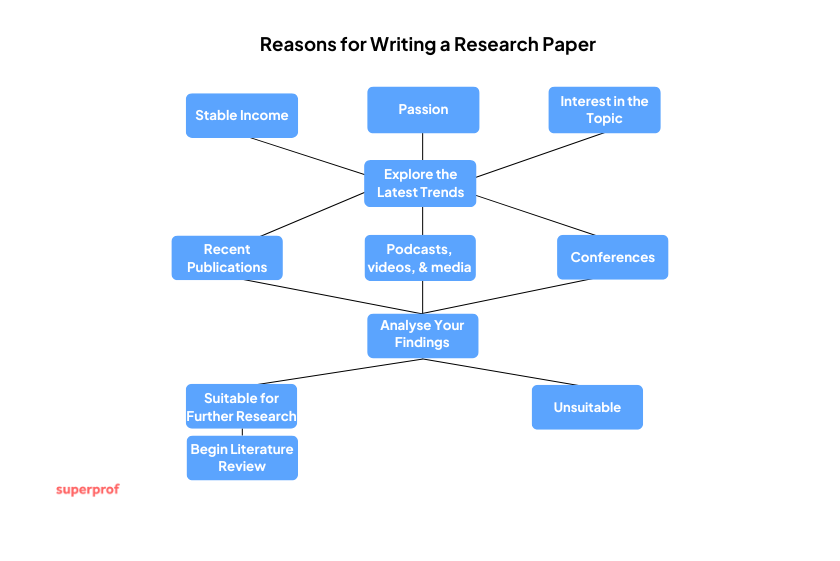Research means that you don’t know, but are willing to find out.
Charles F. Kettering
Many students consider research and writing exercises a stressful and onerous task. For them, an end-of-school research assignment is in the same ballpark as end-of-year exams: little more than a rite of passage. Charles Kettering, and the scholarly world, beg to differ.
A type of elaborate essay in which the writer presents a question or hypothesis, to subsequently analyse and evaluate.
That definition suggests a layered proposition. It means that students aren't answering queries posed to them; they must themselves pose the query, and then answer it. This, in turn, supposes that the writer has the interest and desire to discover more about their chosen subject. And, it presumes they have the discipline, knowledge and cognitive faculties to undertake such an assignment.
Rather than seeing research assignments as implements of torture, students should consider them instruments of growth. However, as with any instrument, you must learn how to use it to gain its maximum benefit.
This guide takes you through the research process, and helps you understand each component's function and purpose.
As you read through it, you'll discover:
- a process of analysis to refine and define your thinking
- what academic writing entails and the time to complete your project
- the steps to follow as you research and write
- the tools and resources required for a successful project
- student voices describing the writing process

What Is Academic Research?
As noted in our introduction, a research project is an exercise in essay writing. However, it differs from the standard essays you wrote in secondary school.

Firstly, your teacher won't give you a prompt. You must decide on your own what to write about.
Secondly, the concepts you present must include analysis of already-existing knowledge. This assignment differs from past essays you've written. For those, you likely injected your own thoughts and ideas. In this regard, scholarly writing is more akin to drafting a book report than penning an essay.
In many respects, drafting a paper isn't so different from composing a thesis1. In fact, they're both exercises in academic writing. The processes to create those documents are the same. However, each one has distinctive qualities that the other does not.
A thesis ranges between 20,000 and 80,000 words. It revolves around a central query, that leads to research.
A thesis is a final project, subject to review by an educational committee. It is the last step towards earning a university degree.
These papers are proportional to the study they describe. They revolve around a central argument, rather than a question.
An academic paper is an evaluation, interpretation, and/or discussion of existing material.
In many countries, schools use the terms 'thesis' and 'academic paper' interchangeably. Much of the language bleeds over, particularly names for these components. Terms such as 'research question' and 'methodology' feature in both. The process2 for creating these documents is similar, too.
Schools in the United Kingdom (UK) follow the distinction laid out above. University undergraduates will present, and defend, a thesis. They may also complete and hand in 'term papers', should their professor assign such task.
An academic writing assignment due at the end of the school term. These papers may include all the same components as other academic writing assignments, and must conform to the same standards of academic rigour.
Students below university level may also hand in term papers. In most cases, they will present a research paper to qualify for access to university. Here, we address this type of assignment.
How Long Is a Research Project?
A term paper is due at the end of the school term during which it was assigned - so, between three to five months. More generally, a research project may last anywhere from one to three years - or more, depending on your current educational level.
In the UK, a Year 13, Advanced-Level student may have to complete an individual research project, in tandem with their other course requirements. For those students, their teachers should introduce related concepts towards the end of Year 12. That gives A-level candidates all summer, plus their entire last year, to plan, research, and write their papers.
End of Year 12
Learn about research project components
Research query, literature review, research design, data collection, et al.
Year 12-13 holiday
Preliminary reading
Explore subject-related literature.
Beginning Year 13
Formulate research question
Using inductive reasoning, critical thinking, and introspection.
By Autumn break
Research design complete, begin collecting data
By February break
Begin analysing findings
By Easter break
Structure findings, begin writing.
Undergraduates have more time to complete their projects. However, this educational level demands more elaborate presentations. For instance, they will detail and justify their research methodology more extensively. They will apply different research and analysis methods, depending on their subject and data type.
This is typically observation-based. This type of analysis is for concepts that are not represented numerically, such as art and literature.
This is typically numbers-based. This type of analysis is more prevalent in maths and science subjects, such as economics and chemistry.
The type of data3 you use depends on your subject. Language studies, arts or marketing papers typically demand qualitative analysis. Quantitative data is well-suited to scientific or mathematical subjects, as well as business and economic issues.
A blend of both data types - mixed data, suits a wide range of study fields. Students shouldn't constrain their research to one type of data exclusively, based on their subject. Instead, make the most of your findings by using mixed data, when appropriate.
Regardless of the type of data their research calls for, university students have a more generous timeline. This general guideline proves that the sooner the student starts on their project, the better they can assure themselves of timely completion. Besides, that's a great way to keep your advisers from nagging you about your progress. 😎
1st phase, 2-3 months
Research and Outline
Formulate research question, begin gathering resources, draft an outline
2nd phase, 6-12 months
Proposal and review
Solicit reviews from peers and advisers, revise the proposal, if needed
3rd phase, 1-2 years
Writing and editing
Draft each component as a standalone paper, submit for review, edit as needed.
4th phase, 6-12 months
Production and submission
Submit full draft document for review, revise and edit per recommendations.
As these two timelines show - and as Rose informs us, gathering facts and figures is perhaps the quickest stage of research. Especially with search engines to do the digging. Organising and 'cleaning' those materials takes far longer, but doing so shortens your analysis time.
Step 1: Check for and remove duplicate data, inconsistent data, and erroneous information.
Step 2: Standardise formats: units of measure, category presentation, positive/negative (survey) responses, et al.
Once you have enough clean data to arrive at tentative conclusions, you're ready to formulate a research question. It must be targeted and specific, as too broad a concept could lead to an incomplete analysis.
How to Develop a Research Question, Step by Step
Often, people begin an undertaking with no thought to possible difficulties down the road. Maybe they anticipated generic hardships, but had no clue what such might be.
You too might have started something with gusto, only to arrive at "What have I got myself into?".
Narrowing your subject interest down to a single 'question' is crucial to your success in answering it. A bit of root cause analysis is all it takes to pinpoint the query you'd most like to address.

A problem-solving tactic for identifying a focal point of a happening, event, or situation.
RCA entails asking what, why, and how until you arrive at a query you don't have an answer for. This process helps you uncover the reason you wish to address that issue. Once you're clear on that, you can start your search for information.
Why This Subject / Topic?
You can't hone in on a research question until you understand why you wish to pursue this subject or topic. You may have more than one reason but, if that's the case, you must decide which reason is the most important. That will help inform your style, and your document's content. These are the main reasons students choose their course of study.
- stability
- lucrative career
- good future
- prestige
- truly passionate about it
- intellectually driven to it
- family tradition
- a nobel cause
- no particular interests
- hoping for something interesting
- what brings the most points for the least effort
Whether your main reason for choosing this subject is in the first, second or third column, your motivation forms the basis of your research question. What do you want to learn about this field, that comes the closest to your reason for choosing it? Vince, a student at the University of Art London, recommends you strive to build your topic around that.
The Process for Choosing a Topic

The Question of Time
Start as early as possible; even before your teacher or adviser discusses writing papers.
Let's imagine a student discovers the documentation for their chosen topic isn't enough to satisfy their research question. They must then find another point to research. Such happens more often than one might think.
With so much output, students must scramble for a theme with enough documentation to establish their arguments. Thus, going through their RCA exercise as early as possible gives them a head-start on their documentation search.
The Literature Review
A literature review consists of analysing and evaluating existing literature related to your topic.

That calls for copious reading, because information from several outlets gives your work balance. As you read through the literature, you'll makes notes of the arguments different authors make.
Should you find several papers discussing the same point from the same author, research that writer, too. Knowing their background will give you context, even though you might not report on that information in your text.
Different Types of Sources
From this header alone, you might wonder if those types might be print, video, web-based, or other. Not a bad guess, but in scholarly writing, we categorise them as primary and secondary.
- historical records
- government documents
- statistics and data reports
- first-person accounts
- peer-reviewed collections
- reviews and critiques - film, books
- encyclopaedia and dictionary
- scholarly publications
Primary documentation includes diaries, memoirs, and personal letters of first-hand accounts. They supply direct evidence to support your topic. By contrast, secondary sources are any publications that summarise and/or interpret primary informants.
Identifying a source as primary or secondary can be tricky. For instance, a student researching labour practices might reference trade journals as secondary documentation. However, if their research is about the history of labour unions, trade magazines can be a primary source. 👍
Where to Find Quality Sources
We're so fortunate to live in a time when the world's knowledge lies at our literal fingertips. We can enter any query into our devices - we don't even have to type it! And it doesn't have to be a whole query; a series of keywords is enough. Within seconds, we have thousands of results to comb through.
Wading through such a trove is enough to discourage even the most hardy researcher 😫. To keep from getting buried in facts, figures, and documents, these qualifiers will refine your search.
| 🔧Operator | ✅How to use | 🤝What it does |
|---|---|---|
| and | Enter keywords joined by 'and'. Ex: iodine and salt and health | delivers results that include all those search terms. |
| or | Enter keywords joined by 'or'. Ex: iodine or salt or health | delivers results that include one of those search terms. |
| not | Enter keywords separated by 'not'. Ex: iodine not salt | delivers results that feature only the desired keyword, while excluding results that feature other listed keywords. |
| " " | Enter a keyword or phrase between quotation marks. Ex.: "iodized salt" | delivers returns containing only that exact phrase. No returns for either 'iodized' or 'salt'. |
| * | Enter an incomplete word with an asterisk after the last letter Ex: iodi* | delivers results for all endings of the word: iodine, iodize, iodic, iodide, and so on. |
| ? | Enter a question mark in place of a letter when unsure of spelling Ex: iodi?e | delivers results for all possible spellings: iodize, iodise, iodide, iodine, and so on |
| () | Enter keywords you want grouped in the brackets. Ex: (iodine or salt) and health | delivers results that include either iodine and health, or salt and health. |
Even using these operators, you must sort through the results, and determine their suitability. For that, you only need one test.
Current: how old is the information?
Relevant: does the data and arguments address your research question?
Accurate: spelling, grammar, non-plagiarised, evidence-supported.
Authority: the quality of your information
Purpose: the source's purpose - commercial (.com), educational (.edu), non-profit (.org), etc.
You must make sure your information is as recent as possible. Older materials are great to gain a historical perspective, but you should base your analysis on the latest facts.
Also, sources' purpose gives their material more weight. For instance, '.edu', '.org', and '.net' web addresses typically present content suitable for formal research. Conversely, '.biz', '.com', and '.pro' domains offer more general, or industry-targeted, content.
Qualified sources are the shortcut to qualified search results. You can count on your school and local libraries to offer such documentation. Also, your teacher may give you a list of books and websites to search, or you might find some on a Student Room thread. How many of these pages have you already accessed?
| ⛲Source | 🔍What you'll find | 🌐Where to find it |
|---|---|---|
| Research Gate | Peer-reviewed scientific papers | https://www.researchgate.net/ |
| Journal Storage - JStor | Academic journals, primary sources, books, and more | https://www.jstor.org/ |
| Sage Journals | Open-access and subscription-based academic journals. | https://journals.sagepub.com/search/advanced |
| ERIC | Academic papers, mainly about education | https://eric.ed.gov/ |
| Taylor & Francis Online | Peer-reviewed papers and journals, arranged by subject. | https://www.tandfonline.com/ |
| United States National Library of Medicine | Health-related papers | https://pubmed.ncbi.nlm.nih.gov/ |
| National Institutes of Health | Health- and medicine-related papers | https://www.ncbi.nlm.nih.gov/ |
| UK Health Security Agency | A searchable database of health and medical studies. | https://researchportal.ukhsa.gov.uk/ |
| Statista | A database searchable by topic. | https://www.statista.com/ |
| Un-paywall | Allows access to research pages behind paywalls. | https://unpaywall.org/ |
| Open Access | An un-blocking platform, searchable by author or other information - NOT by topic. | https://openaccessbutton.org/ |
| Google Scholar | Like searching Google, but strictly for academic papers. | https://scholar.google.com/ |
| Wikipedia | The reference section for each article is a research goldmine! | https://www.wikipedia.org/ |
Tools for Your Research
Delving into your subject's literature, including authors' bios, demands organisation. In fact, you shouldn't begin your research project without becoming familiar with the best organisation tools and applications. You may even rely on the timeless spreadsheet - but newer apps will serve you just as well.
| 🔨Tool | 📷Logo | 💿What it does | 👷♂️How to Use it |
|---|---|---|---|
| Mind Meister | Creates customisable mind maps. | Create one map per topic; connect information visually. | |
| EverNote | Helps create outlines for essays and theses; includes space to add links to research materials | Create a free account to save web content, and upload visual and print media. | |
| Diigo | Tags and bookmarks pages for future reference | Either as an app, or a Chrome extension. Bookmarks can remain private, or you can share them. | |
| Mendeley | Builds a web-based, customised library of resources. | Create an account to store your references in the cloud so you can access them from all your devices. | |
| Zotero | Saves references in many formats, including PDF and ePUB. | Download the desktop app and browser connector extension to build your Zotero library. | |
| Bookmarks | Save web pages for future reference. | Create a file in your computer's 'bookmark' application. Click your web browser's bookmark icon to save pages. | |
| Spreadsheets | Catalogues your resources and helps organise data. | Create a spreadsheet to enter data, corresponding web pages, and make notes. |
Research Methodology
As you design your research, you will choose the tools and methods that best accomplish your aims. Reviewers cannot guess what your methods and resources are, nor why you chose them. Thus, you must explain yourself.
It's similar to showing your work on a maths assignment, or justifying a written response. Teachers want to see how you arrived at your answer, even if it's correct.
1. Why did you choose these research methods?
2. How did those methods contribute to, and satisfy, your research?
This section is about possibilities. You want to lay out the goals you hoped to achieve, and your anticipated results. You must also explain how you expected your process to achieve them. In this discussion, you must declare whether you applied qualitative, quantitative, or mixed methodology.
Your methodology chapter must maintain a past-tense tone, even if you're still drafting on your project. It should read as though you're reflecting on past work, and explaining your past actions.

Writing an Academic Paper
Jane Goodall

Jane Goodall's research in primatology has redefined the concept of long-term field research. Her catalogue of field data and research papers now reside at Duke University, in the US state of Minnesota.
Tu Youyou

Tu Youyou's research in Chinese Medicine led her to formulate the world's first anti-malaria drug. She won the Nobel Prize in Chemistry for this work. Her papers in medicinal chemistry influence research around the world.
Shinya Yamanaka

Shinya Yamanaka's research in cellular biology led to the discovery of stem cells. His work turbocharged medical advances, giving hope to millions who suffered formerly incurable conditions.
Stephen Hawking

Stephen Hawking is world-renowned for his work in cosmology and theoretical physics. His doctoral dissertation is the most-requested publication from the University of Cambridge's library.
All of these world-renowned scholars faced hardships when writing their papers. You might discover you share their personal and academic challenges when drafting your paper. And, you might note a common theme.
They all insist that following guidelines helped their writing processes. The length of each section is likely the easiest, and most useful one, to follow.
| ⚙Component | ❓What to include | ➗ How much of your paper |
|---|---|---|
| Introduction | Your topic overview. Your research question, with an outline of your work's scope and purpose. Information to grab the reader's interest. | 10 - 12% |
| Literature Review | Organise selections by theme. Summarise each source. Evaluate each entry's strengths and relevance. | 15 - 20% |
| Methodology | What your research aims to prove. Description of your research design. Methods and materials used. Explain methods and techniques to interpret your data. | 10 - 12% |
| Finding/results | Key findings, especially those related to your research question. Charts and graphs. | 15 - 20% |
| Discussion | Interpreting results, importance and relevance to your topic. Point out limitations. | 15 - 20% |
| Conclusion | Summarising your findings, and the whole paper. | 5 - 7% |
| Bibliography | Your primary and secondary sources | 5 - 7% |
These percentages prove that some components will take longer to produce than others. That suggests attending to them before the peripheral parts, such as your introduction and bibliography. Besides, composing your introduction last will help you choose targeted keywords that best support your contentions. ✌
Going from introduction to conclusion may make your task repetitive, as you will likely revise what you wrote earlier. Start with drafting your literature review section instead, or your methodology chapter. You should build your reference list as you progress.
Building an outline is your first task. You may use the one above - intro, lit. review, and so on, to frame your effort. Consider creating a timeline4, with specific target dates to complete each phase. Give yourself lots of room to add notes under each task.
Such might include points you wish to include in your text, a status/progress indicator, and information you might ask of your teacher. You never know when a nugget of information will send you on a side quest. 🧙♂️ Such adventures invariably enrich your knowledge, despite not necessarily contributing to the job at hand.
Unlike essay writing, these documents don't require a narrative flow from one chapter to the next. Or, better said: consider each segment a complete essay, whose narrative draws on the surrounding information. Placing these imaginary breaks makes your task feel more manageable.💪
You'll find that doing so helps you find the 'right voice' for each section. For instance, your methodology chapter should sound as though you're reflecting on your efforts. But you should infuse your discussion section with warmth and passion, to demonstrate your connection to your subject.
Such tone changes are hard to manage if you think of your assignment as a monolith. See it as a collection of components, instead. Then, you can set your mind for each section, unburdened by what all the others must do and sound like. This mindset also makes it easy to follow your timetable for completion.😊
Writing A Bibliography
As you conducted your literature review and collected data, you must have noted your sources. If so, you've already done the hardest, and most labour-intensive part of bibliography construction. Now, you only need to list them at the end of your paper.
That's easier said than done. Should you build a 'cited works' section, a 'reference' section, or a bibliography? They all represent material you drew on for your composition. But what's the difference between them5?
A list of works you quote or paraphrase, arranged alphabetically by authors' last names.
A list of works that informs your writing, arranged alphabetically by authors' last names.
A list of sources you've read that pertain to your paper's topic, but you don't necessarily use in your paper.
To complicate matters, you will cite your documentation using a specific format. Around the world, writers use Chicago-style referencing, or Turabian, or the Modern Language Association (MLA) formats. In-page citations typically call for the American Psychological Association (APA) style.
| 📝Citation style | 😎Examples |
|---|---|
| APA APA w/web reference | Freeman, C. W. (1994). Diplomat’s Dictionary. DIANE Publishing. OpenLibrary.org (2024). The diplomat’s dictionary by Charles W. Freeman | Open Library. [online] Open Library. Available at: https://openlibrary.org/works/OL2628370W/The_diplomat%27s_dictionary [Accessed 17 Sep. 2024]. |
| MLA MLA w/web reference | Freeman, Charles W. Diplomat’s Dictionary. DIANE Publishing, 1 Nov. 1994. OpenLibrary.org. “The Diplomat’s Dictionary by Charles W. Freeman | Open Library.” Open Library, 2024, openlibrary.org/works/OL2628370W/The_diplomat%27s_dictionary. Accessed 17 Sept. 2024. |
| Chicago Style Chicago Style w/web reference | Freeman, Charles W. 1994. Diplomat’s Dictionary. DIANE Publishing. OpenLibrary.org. 2024. “The Diplomat’s Dictionary by Charles W. Freeman | Open Library.” Open Library. 2024. https://openlibrary.org/works/OL2628370W/The_diplomat%27s_dictionary. |
| Turabian Turabian w/web reference | Freeman, Charles W. 1994. Diplomat’s Dictionary. DIANE Publishing. OpenLibrary.org. 2024. “The Diplomat’s Dictionary by Charles W. Freeman | Open Library.” Open Library. 2024. https://openlibrary.org/works/OL2628370W/The_diplomat%27s_dictionary. |
| Harvard Style Harvard Style w/web reference | Freeman, C.W. (1994). Diplomat’s Dictionary. DIANE Publishing. OpenLibrary.org (2024). The diplomat’s dictionary by Charles W. Freeman | Open Library. [online] Open Library. Available at: https://openlibrary.org/works/OL2628370W/The_diplomat%27s_dictionary. |
As a rule of thumb, your teacher, or the assignment instructions, will declare the desired reference style. In the UK, schools generally prefer the Harvard referencing style. As noted in the chart, this style allows for website information.
Your bibliography is your main reason for noting your sources as you research. You can always delete a reference if you don't use it. But should you decide to use it, it will be harder find if you didn't make note of it when you first saw it.
Some students don't mind manually typing all their references in proper format; a time-consuming proposition. You should discover free referencing generators, such as MyBib. You input information about the source, and the platform will format your reference for you.
As you can see, it presents different citation styles, and welcomes information from every possible type of media. Think of how much time those copy/pastes will save you! 🤩
The Point of Referencing
Today's technology makes academic dishonesty far too tempting. Demonstrating your integrity is one reason for citing. That doesn't mean that plagiarism is a novel phenomenon, or the only reason to list citations. Long before ChatGPT, learned writers listed all the books and studies they read, too.
That way, those writers pointed fellow researchers to materials they might not have discovered yet. They gave others the opportunity to test the writer's theories. Those references give the academia the means to evaluate, critique, and build on each others' efforts.👷♂️
These are a few external reasons for listing your sources. From your perspective, creating this list helps you stay organised. Using your outline to organise informants directs you to the proper reference, should you need to refresh your memory on a point or fact.
Enter each resource into your outline, under the section it's relevant to.
A Checklist Before Submitting Your Work
Many students contend that crafting a research paper is tiresome and pointless, but the bottom line is that you benefit - not your educators.

You might not sense the positive effects this exercise brings you while in the thick of execution. However, you'll realise how much you've grown, as a person and an intellectual, when you review your paper.
Penning a research paper first demands that you examine yourself and your desire to understand your subject. Doing so cements your commitment to your task, and arms you with the motivation to see it through.
This intellectual process challenges your curiosity and fosters your desire to learn about and understand yourself. Even Socrates advocated performing RCA on oneself as a lifelong exercise.
We should be conversing on many topics, every day, in order to understand ourselves.
Socrates
From a document-drafting standpoint, this self-examination cuts out all the external 'noise'. Noise means peers, parents, and the pressure to earn high marks; the competitive nature of academia, and the society-driven mandate to succeed. With all that stilled, your research question emerges on its own. Once you land the matter you want to address, follow these steps:
- Outline your paper.
- Conduct a literature review, refining your query, if needed.
- Build your bibliography as you review the literature.
- Gather, 'clean', and analyse your data.
- Record your findings, and note your methodology.
- Begin writing, starting with the most demanding sections.
- Bookend your work with a targeted introduction, and a well-sourced bibliography.
- Revise and proofread each section before moving on, and the whole document upon completion.
Your educational level - secondary school/college, undergraduate, and so on, determines how much time you have to complete this assignment. You may have as little as one year, or as many as three. Regardless of due dates, remember that this assignment enriches you, as Supriya avers:
Thus, it's wise to take it on not as a rite of passage - something inevitable, but as an exercise in personal growth. That mindset encourages you to work with diligence and zeal. It keeps away the temptation to procrastinate, and to do only a passable job, rather than your best.
Though this is a personal journey, you don't have to go it alone. You have teachers and advisers to counsel you, and you have friends and family for support. Still, you might need more targeted guidance.
On the Superprof tutoring platform, you will find mentors for every discipline, and writing coaches, too. Should you have doubts about your composition skills, a few sessions with a Superprof writing tutor will help boost your confidence.
Conversely, you might intuit that you lack some vital understanding of your subject. In that case, a subject-specific Superprof tutor could help you discover the connections you sense are missing. A few brainstorming sessions with such a mentor are bound to give you new insights into your material. These talks could be the very thing you need to keep you on-task, and find new avenues to explore.
Sources
- S, Surbhi. “Difference between Thesis and Research Paper":https://keydifferences.com/difference-between-thesis-and-research-paper.html
- Daniel Parker, "How to Reasearch a Topic: A Step-by-Step Guide": https://essaypro.com/blog/how-to-research#Conclusion
- Clara Llebot, "Data Types & File Formats": https://guides.library.oregonstate.edu/research-data-services/data-management-types-formats
- University of Western Australia, "Planning a Research Project": https://www.uwa.edu.au/students/-/media/Project/UWA/UWA/Students/Docs/STUDYSmarter/HM1-Planning-a-research-project.pdf
- Chegg, "Works Cited vs. Bibliography vs. References": https://www.citethisforme.com/citation-generator/citation-basics/bibliography-vs-works-cited-vs-references
Your Academic tutoring tutor is waiting for you on Superprof!
Want to give it a try?
Let our experts impress you!
Summarise with AI:

















